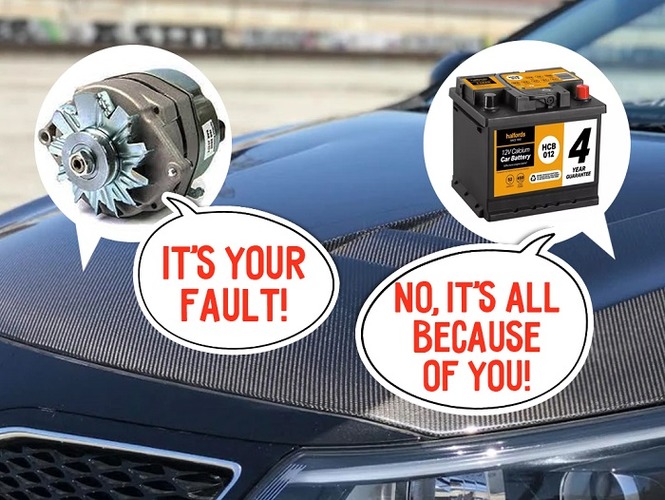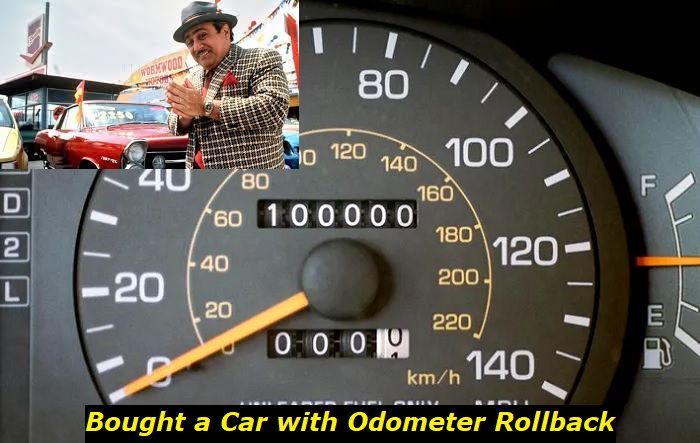
Your car’s electrical system is comprised out of the battery, the starter, the alternator, and a bunch of wires and relays. The purpose of the battery is to power the starter in order to turn on the engine, and the purpose of the alternator is to charge the battery while the car is running. This system can sometimes cause issues that make your car undrivable. If you want to properly diagnose the issue, be sure to read this article.
Symptoms of a bad alternator:
- Engine unable to crank and stalls frequently
- Dimming/flickering lights
- A dead battery
- Burning smell and Wierd Noises
- Malfunctioning Electrical Accessories
Symptoms of a bad battery:
- Dim lights
- Slow engine or no start
- Battery corrosion
- Old battery or a swelling battery
- The smell of Rotten Eggs
- Clicking sounds on start-up
Symptoms Of A Bad Alternator
Engine Unable To Crank And Stalls Frequently
If your engine stalls immediately after starting, it usually means that your alternator is unable to power the battery. However, if you are unable to start up the engine at all, it often means that the alternator was not able to charge the battery beforehand, which in turn resulted in a dead battery.
Dimming/Flickering Lights
If your lights are dimming/flickering, it means that your alternator is unable to provide a constant current to the battery. In order to be sure, try to rev up the engine, and if your lights suddenly become brighter while your engine is at a higher RPM, you are definitely experiencing alternator issues.
A Dead Battery
This one is a little bit confusing, but if your alternator is unable to charge the battery, this usually leads to a depleted battery. To be sure that the alternator is to blame, try to jump-start the car, and if it keeps running after you’ve started it, it means that the alternator is providing power to the battery.
Burning Smell and Weird Noises
If you sense any burning smells or weird noises while idling or revving up the engine, it usually leads to a worn-out or damaged alternator belt. A burning smell can also often lead to a burned alternator wire, this usually happens if the wire was fried due to increased levels of electrical resistance.
Malfunctioning Electrical Accessories
Modern-day cars are equipped with state-of-the-art ECU computers which are designed to provide power on a priority basis. So if some of your electrical systems are slow to respond, or they don’t work at all, while others such as the headlights are functioning properly, it means that the alternator is providing inconsistent current and the systems need to decide which system is more important.
Symptoms Of a Bad Battery
Dim Lights
If your dashboard lights or headlights are dim before you start the engine, it usually means that your battery is depleted because your battery powers all of your electricals while your engine is off. If you turn on the engine, and everything slowly powers up, it also means that your alternator is functioning properly and is charging the battery.
Slow Engine Start or No Start
If your engine is unable to start or is slow to respond, be sure to jump-start the car. If your engine starts and keeps on running, but it won’t start after you’ve turned it off, it usually means that your battery is dead. However, if the engine stalls immediately after turning it on, it means that your alternator is to blame.
Battery Corrosion
Your battery is equipped with high voltage terminals which can sometimes corrode, and if you don’t clean them up immediately, they can cause serious battery issues. Corrosion such as this impedes electrical energy which makes the battery unable to charge. Be sure to invest in automotive-grade corrosion cleaning agents and rust prevention products to proactively solve these issues in the future.
Old Battery or a Swelling Battery
Batteries are designed to last 3-5 years. However, if you live in extreme climate regions, your battery can swell up or warp itself which requires you to replace the battery even sooner. Be sure to inspect the battery for any physical inconsistencies which might lead to swelling. If so, you need to change the battery as soon as possible because a warped battery might even explode.
The Smell Of Rotten Eggs
A properly functioning battery is never going to vent any unpleasant smells. That being said, if your battery is overheating, the sulfuric acid that can be found inside a modern-day car battery tends to convert into Hydrogen Sulfide gas which is known to cause a rotten egg-like smell. As such, if you do sense a rotten egg type of smell, be sure to check the catalytic converter as well because this is also a common symptom of catalytic converter issues.
Clicking Sounds On Start-Up
Another fairly common symptom of a dead battery is when you hear a clicking sound while trying to start the car up. This usually means that your battery is completely dead and can not be used to start the car up. However, this can also point towards alternator issues even though it is mostly associated with just a dead battery.
Faulty Alternator Effects On A Working Battery
As mentioned, a faulty alternator can also completely kill your battery in a myriad of different ways. The most common issues of alternator-induced battery problems are overcharging and undercharging. Overcharging is an effect where the alternator sends excess voltage to the battery which can cause the battery to swell up or even explode.
On the other hand, if the alternator is undercharging the battery it means that the alternator is sending insufficient voltage to the battery which is most commonly caused by an incorrectly mounted diameter pulley. Either way, this can deplete your battery faster or slower depending on how much voltage is being sent from the alternator to the battery.
However, if your alternator completely dies while your car is turned on, your battery is likely to follow in about 30-60 minutes time. If the battery is already on its last leg while this is happening, it can even completely discharge the battery in a few minutes.
Faulty Battery Effects On A Working Alternator
Even though a faulty alternator will cause damage to the battery, a faulty battery will not cause any damage to the alternator. This is because an alternator is nothing but an electric generator or a dynamo designed to charge the battery up when necessary.
Most alternator-related issues are being caused by all sorts of leaks or design flaws because an alternator is a fairly precise piece of machinery that needs a proper environment to function properly. Sometimes the alternator can be damaged by water or even salt intrusion but this is not as common as issues caused by leaks.
However, alternators are generally fairly reliable and they mostly tend to go bad due to age-related issues. Most alternators should serve you well for at least 80k miles, yet some of them are known to last even twice as long.
FAQ Section
How Much Does A New Car Battery Cost?
A new car battery costs between $50-$250 depending on the brand and whether it’s a premium battery or not. Some higher-end cars require special batteries which can only be acquired through the dealer and they tend to cost as much as 10 times more than a more regular battery. So be sure to treat such cars with extra care in order not to completely decimate your bank account.
How Much Does A New Alternator Cost?
A new alternator usually costs between $300-$2000, but these can vary greatly depending on various factors. Labor costs also tend to vary greatly depending on how accessible the alternator is and how much work is needed to replace one. Either way, make sure to always use original parts when it comes to vital car components as it’s never a good idea to skimp out on these.
Is It Worth Tt Fixing A Broken Alternator?
An alternator costs a lot of money, but it's always better to replace the alternator if it starts causing severe issues. If you do decide to repair it, you need to be aware that the fix might not last a long time. This process is also known as “remanning” the alternator which usually includes taking out worn out and damages alternator components and replacing them with newer ones.
Can A Bad Alternator Damage My Battery?
Yes, very easily. Common issues with faulty alternators are overcharging and undercharging, both of which can damage your battery quickly. Therefore, it's always best to properly identify the culprit between these two and replace them immediately in order not to cause any additional damage.
How Do I Know Which Battery To Buy For My Car?
It's always best to check the owner’s manual, however, you can also look for info on your old battery if you still have it, or contact the dealer. Another way to find out which battery is to search for it online as most car-enthusiast forums have loads of info on which battery is the best for your car and where you can get them at the lowest available prices.
About the authors
The CarAraC research team is composed of seasoned auto mechanics and automotive industry professionals, including individuals with advanced degrees and certifications in their field. Our team members boast prestigious credentials, reflecting their extensive knowledge and skills. These qualifications include: IMI: Institute of the Motor Industry, ASE-Certified Master Automobile Technicians; Coventry University, Graduate of MA in Automotive Journalism; Politecnico di Torino, Italy, MS Automotive Engineering; Ss. Cyril and Methodius University in Skopje, Mechanical University in Skopje; TOC Automotive College; DHA Suffa University, Department of Mechanical Engineering






Add comment